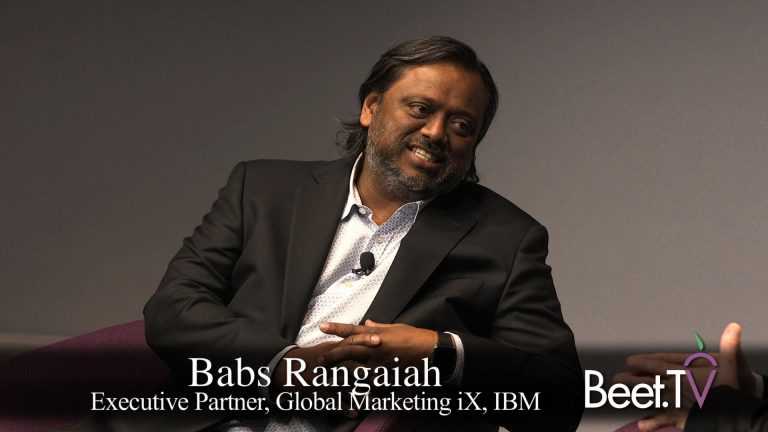
The technology used to process cryptocurrency doesn’t need to be particularly fast. At peak, there were barely 500,000 global Bitcoin transactions per day.
When you think about using the same technology for digital ad management, however, it becomes clear that the infrastructure would need to cope with tens of millions of transactions per second.
Many people are starting to talk about the prospect for blockchain, the technology underpinning crypto-currency, to help manage the digital ad supply chain. The reality that blockchain solutions today suffer from a kind of latency that makes them unsuitable to digital ad scale may put the brakes on those dreams.
But not for Babs Rangaiah.
“In the 90s, we knew that you could do a ton of things in marketing online – whether that’s video, video ads, video content – but no one had broadband,” says the IBM global marketing executive partner in this segment from the Beet Retreat moderated by Rob Norman: “But in a few years we know it will, so, (we said), ‘let’s prepare ourselves’.”
Could the same be true for blockchain technology? A blockchain is a public, distributed, anonymised ledger of transactions that is supremely trackable and traceable. It is the technology that underpins digital currencies like Bitcoin, but, in theory, those “transactions” don’t have to be monetary.
Advocates say blockchain can be used to track and trace any goods – physical or digital – that move within a system in which provenance is paramount. And much of the attention is turning to digital advertising, a sector which is mired in concern over fraud, accountability and identifying where every fraction of a cent is siphoned off.
Digital ad real-time bidding latency requirements are strict. A DSP typically requires a response within 60 to 75 seconds. There’s a real it’s called “real-time”.
That poses a challenge to blockchain dreams. Most blockchain solutions operate slower than that. In tests to mine crypto-currency, IBM’s Hyperledger infrastructure clocked more than 3500 transactions per second with 300 to 400 millisecond latency.
But bringing transparency to ad-tech doesn’t require mining for new virtual coins. And Rangaiah is convinced things will get quicker.
“If you’re thinking about blockchain, it’s a little bit like (broadband in the 90s),” he adds. “People think if you have high-volume transactions you won’t be able to do it on blockchain, it won’t be able to capture it and still get the consensus mechanisms in place with the smart contracts..
“The reality is it’s moving very fast, just like the internet. There’s a number of new companies coming in place.”
When the speed catches up, blockchain could be a perfect solution, premised on an “immutable ledger”, meaning actions that occur within the digital supply chain would be recorded in a way that cannot be tampered with.
At Cannes Lions, IBM and Mediaocean announced “a blockchain consortium for the digital media supply chain,” along with Unilever, Kellogg and Kimberly-Clark.
This video was produced at the Beet Retreat in City & Town Hall on June 6, 2018 in New York City. The event and video series are presented by LiveRamp, TiVo, true[X] and 605. For more videos from the series, please visit this page.